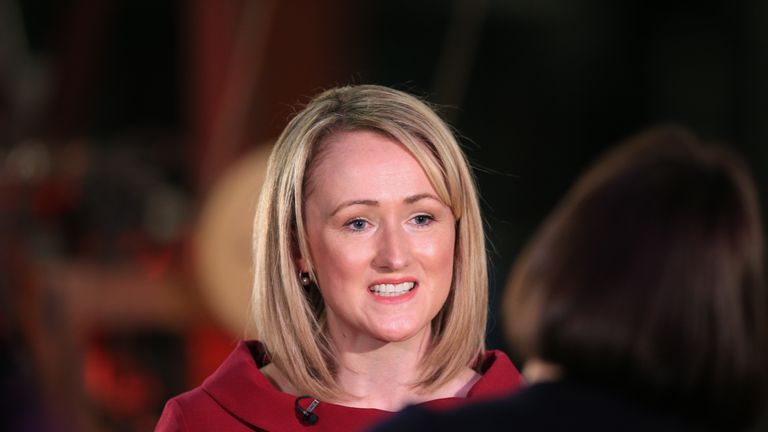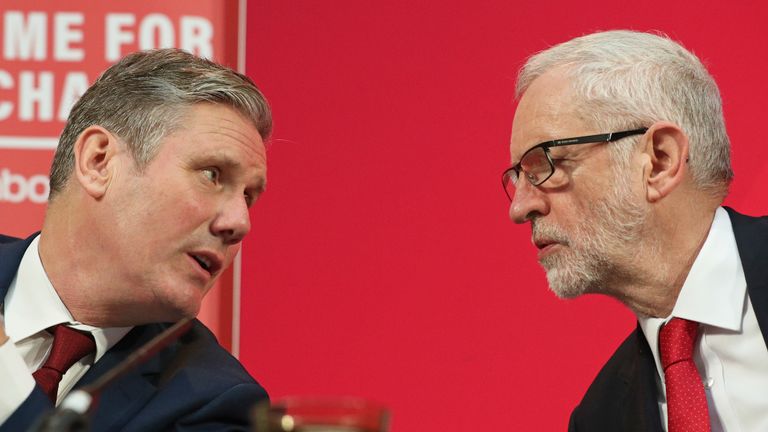Labour leadership: Long-Bailey and Sir Keir tipped as main runners
The Labour race is set.
Sir Keir Starmer versus Rebecca Long-Bailey with Lisa Nandy as the wildcard – and Emily Thornberry fighting to make it through to the final round.
Ms Long-Bailey won the formal backing on Friday night of the Unite union.
The shadow business secretary insists she is not continuity Corbyn, but the machine that put him into office is now cranking up to try to install her as his successor.
Jon Lansman’s Momentum, which grew out of Mr Corbyn’s 2015 leadership race, is driving her campaign and his other key ally Len McCluskey is putting his union firepower behind her too.
Mr McCluskey said on Friday night his union had overwhelmingly backed Ms Long-Bailey, who he said has the “brains and brilliance” to beat Boris Johnson.
Ms Nandy is through to the final round, but this election race still looks very much like a straight run off between Ms Long-Bailey, the candidate of undiluted Corbynism, versus Sir Keir’s ‘competent Corbynism’ pitch.
Mr Corbyn might not have won the argument in the country when it came to his socialist vision for Britain, but his politics are in the ascendancy still when it comes to the Labour Party and this leadership race.
The bigger, existential question for the Labour movement is which of these candidates can win the argument not just in the party bit with former Labour voters too.
For there is a dramatic disconnect between the party members and Labour voters who turned away from Mr Corbyn and Labour in the election.
Touring some of Mr Johnson’s newly won seats in the North East this week – Blyth Valley, 712 majority, Durham North-West 1,144 majority, Bishop Auckland 7,692 – its clear that Brexit was a critical reason why voters turned away from Labour.
But Mr Corbyn’s leadership was repeatedly raised too, as was what some former Labour voters saw as a ‘moon on a stick’ manifesto.
There was another common theme as well: in those communities over 250 miles away from London was a public worn out by political conflict and division.
All the people I spoke to talked about wanting a unified country once more.
That is perhaps why Sir Keir’s unity pitch has obvious resonance with many party members and activists who must have picked up this dissatisfaction on the doorsteps during the election.
Sir Keir is miles ahead on this race by any measure.
Polling puts him out front with party members; he topped the ballot with MPs and has gathered up more constituency labour party nominations than all his rivals put together.
But this is a long race and Ms Long-Bailey has powerful institutional and organisation backing now in the form of Unite and Momentum.
Unite will now put financial firepower behind her while Momentum will be her campaigning wing. She has all the tools at her disposal to begin narrowing that gap.
Yet there are tensions within her campaign as Ms Long-Bailey pushes ahead with a radical agenda.
Her decision to back mandatory re-selections of MPs before a general election this week delighted her Momentum base.
But her union backers fear this is the sort of policy that serves only to stoke controversy and division around her candidacy.
They would prefer Ms Long-Bailey to focus less on policy and more on personality and identity.
Ms Nandy, who started out well behind in the field is picking up support via her strong media performances and smart campaign.
But the Wigan MP’s decision to not just quit Corbyn’s front bench in the 2016 coup but go onto co-chair Owen Smith’s leadership campaign – a subject I hear she raised herself in her opening statement at the Unite hustings on Friday – makes her toxic still with huge swathes of party members.
And perhaps this election will be decided by the extent to which members want to draw a line under fierce factional infighting and take the fight to the Tories once more.
The early stages of this race suggests members are putting a premium on unity.
Sir Keir’s pitch that the path to victory begins with soft Corbynism, competent leadership and a cessation of internal battles is a winning combination for now.
But we are only in the foothills of a very long race.
Source: Read Full Article




